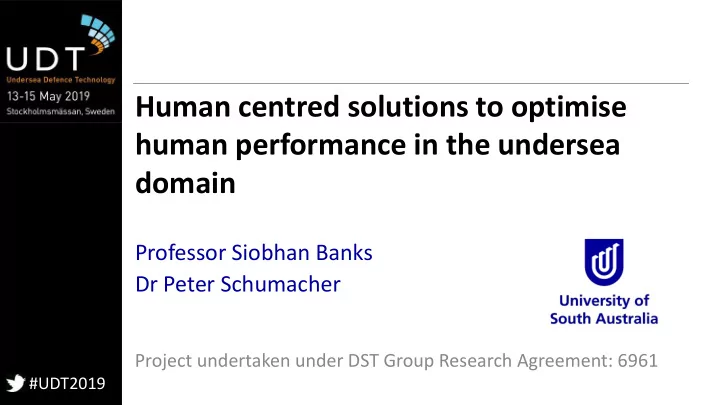

Human centred solutions to optimise human performance in the undersea domain Professor Siobhan Banks Dr Peter Schumacher Project undertaken under DST Group Research Agreement: 6961 #UDT2019
A human-centered design and assurance methodology for submarines The location of the air conditioning vent causes complaints and is addressed with user modifications. More thought into its location would not cost more but would save crew frustration for the next 30 years. #UDT2019
A human-centered design and assurance methodology for submarines • Develop and demonstrate a design process and methodologies. • Investigate habitability to develop criteria for design development and assessment of designs. • Development of exemplar habitability designs to facilitate rest and reduce fatigue. • Development of physical layouts and apply anthropometric data for design and assessment of the physical fit . #UDT2019
Why does human at the centre matter? The myth of the warrior , that fatigue can be overcome by adequate motivation, has influenced military operations in the past (Shay, 1998). Work is cognitive in nature (as opposed to physical). Managing fatigue to increase the ability to make complex decisions fast becomes a defining advantage. Managing fatigue; via work design (shift schedules); habitation; food #UDT2019
Why does human at the centre matter? …positive morale… Attracting talented individuals, long term crew retention. & …peak mission readiness… Fatigue. #UDT2019
Human Centred Design Principles 1. Understand users, tasks and environments. 2. Users are involved throughout the process. 3. Design is driven user-centered evaluation. 4. The process is iterative. 5. Address the whole user experience. 6. Include a variety of skills and perspectives. #UDT2019 ISO 9241-210 Ergonomics for human-system interaction – Human-centred design for interactive systems.
Human Centred Design Process The Double Diamond developed by the UK Design Council. This #UDT2019 diagram is by Dan Nassler from the consultancy Hyper Island.
Human Centred Design Process #UDT2019
Application of Anthropometric Data #UDT2019
Application of Anthropometric Data Digital Human Models (DHM) are used in CAD models for ergonomics analysis. The reach envelope for the smallest #UDT2019 female from the JACK software
Application of Anthropometric Data DHMs are used in all stages of the process to develop designs that accommodate human sizes and reach envelopes. #UDT2019
Criteria & Scenarios The research leads to criteria and scenarios to inform the design and evaluate design proposals. A sample of design criteria for sleeping berths. #UDT2019
Physical Model Making Models are used to explore and develop design proposals. Early sleeping berth prototypes. #UDT2019
Physical Model Making Models are used to explore and develop design proposals. Early mess prototype in cardboard to establish sizing #UDT2019 and layout.
Virtual Reality VR provides an immersive experience to assist with the development, and communication of design proposals. It is now fast and easy and is used at all stages of the design process. #UDT2019
Outcome Efficient use of space. A diagram showing the advantages of the tapered berth #UDT2019 arrangement.
Outcome Tapered berths and clever storage addresses user needs. #UDT2019
Outcome Full sized prototype for user engagement #UDT2019
Anthropometry Evaluation; • CAD (2D Standard, 3D, VR), • Human simulation software • Physical prototype #UDT2019
Questions? Professor Siobhan Banks Dr Peter Schumacher Project undertaken under DST Group Research Agreement: 6961 #UDT2019
Recommend
More recommend